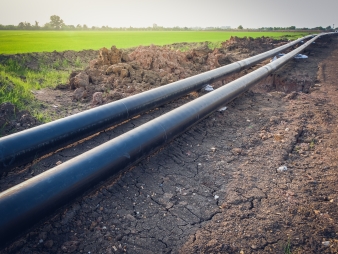Introduction
By the early 1930’s, natural gas and its transportation through pipelines were essential parts of the American economy. In order to facilitate development of pipeline projects to efficiently transport natural gas, both state and federal laws were changed to allow pipelines to acquire rights to cross property by means of eminent domain. In order to protect yourself against the negative effects of pipeline construction, it is important to know the ways in which landowners can protect themselves and their property going forward.
Opposing a Pipeline Route Prior to FERC Approval
In the event that you oppose an interstate pipeline in your area or over your property, it is important to know the key points in the Federal Energy Regulatory Commission (FERC) approval process during which you can affect the ultimate proceedings. Once FERC issues a Certificate of Necessity and Public Convenience, ET Rover Pipeline, subject to certain possible limitations, can ultimately acquire the right to use land on the proposed route by condemnation (the power of eminent domain). The only remaining issues to determine in condemnation proceedings are the terms of the easement and the amount of compensation the landowner is entitled to receive.
Opportunities for Input during the Pre-Filing Period
Under federal law, pipeline sponsors are not required to submit to pre-filing on their proposed pipeline project. Nevertheless, most pipeline sponsors, including ET Rover, submit to pre-filing procedures to expedite the overall approval process. Pre-filing provides the first opportunity for landowners to affect the ultimate pipeline route. Landowners may do so by filing comments with FERC in written or electronic form or by making a statement at one of the scheduled Scoping Meetings.
FERC accepts and encourages written or electronic comments from landowners and stakeholders affected by a proposed project. Based on comments made during this time period, FERC may require additional environmental or historical studies of the effect of the proposed pipeline or require the pipeline sponsor to provide additional alternative routes avoiding sensitive areas.
While FERC staff review every comment filed, every comment is not equally effective. A successful comment should be carefully drafted based on grounds that FERC traditionally considers important in the approval process, include specific facts, and provide viable alternatives for pipeline construction. While an individual landowner may be successful in having a pipeline avoid his property, a major alteration to a pipeline route is frequently the result of a landowner groups acting in concert or a request from a government authority such as township trustees or county commissioners. As a result, if you wish to alter a pipeline route, it is important to obtain legal and organizational assistance.
FERC also holds “Scoping Meetings” to actively seek public input. At these meetings, FERC staff will be present to discuss landowner concerns, take landowner written or verbal comments, and identify local environmental and historical concerns. While a FERC stenographer is present during the proceedings to record comments, Scoping Meetings are more useful as a tool to accommodate public outcry than to provide substantive comments.
Opportunities for Input during the Filing and Review Period
While comments can be filed before and after a FERC application is filed, the filing of the pipeline sponsor’s FERC application provides the first opportunity for a landowner or group to become an actual party in the proceedings by filing a motion to intervene. Intervention, if granted, allows the intervening party to attend all FERC hearings, to request a rehearing of any FERC pipeline approvals, to challenge the basis of subsequent motions to intervene, and to ultimately appeal FERC orders in federal court. Intervening is not a simple process. FERC proceedings are as complicated as court proceedings and are subject to rules of procedure. For instance, a motion to intervene is subject to specific time constraints, must contain certain key information, and must be submitted pursuant to applicable federal law and regulations. Furthermore, intervening places additional responsibilities on the intervening party when participating in FERC filing events or corresponding with FERC. Similar to court proceedings, any parties are allowed to represent themselves in FERC proceedings but, like court, it is highly advisable to retain legal counsel.
Protecting Yourself After FERC Approval
Once FERC has issued a Certificate of Necessity and Public Convenience, ET Rover can ultimately acquire rights to property in the approved easement path through eminent domain. Fortunately, pipeline companies generally prefer to negotiate easements with landowners, especially if those landowners are represented by counsel.
Pipeline easements may be negotiated at any point prior to or after FERC project approval. Easements entered into prior to official approval generally take the form of an option to enter into a specific easement contingent on FERC approval. Negotiating an easement can be a perilous process. Depending on the terms of the right of way agreement, construction and maintenance of a pipeline can be a painless activity or it can be lead to disaster for years to come.
While ET Rover will always say that it treats landowners fairly, it is ultimately up to landowners to safeguard their own interests. While any individual can negotiate her own agreement, due to the complexities of the issues involved and the frequent lack of information or disinformation relating to terms and payments of other easements, it is essential to retain legal counsel.
If negotiations for a pipeline right of way agreement ultimately fail, ET Rover can and likely will institute an action to take an easement over property in the pipeline route. Such an action may take place in either state or federal court and will determine the terms of the easement being taken and the monetary compensation due to the landowner. It will not determine whether ET Rover has the right to take the easement. Landowners may benefit from holding out for litigation if they can support their claims for greater compensation with expert testimony and if the potential benefit outweighs the cost.
Disclaimer
This paper is not intended as legal advice and should not be relied upon as such. If you need legal advice, seek independent legal counsel from a firm such as ours. We are providing a general guide for landowners to protect their property during the planning, approval, construction and operation of an interstate pipeline. Any examples below are fact specific and subject to each landowner’s circumstances.
Tagged In:EasementsET RoverFederal Energy Regulatory CommissionFERCOil and GasPipelines




